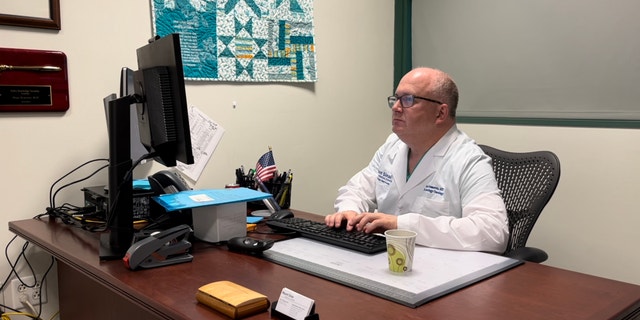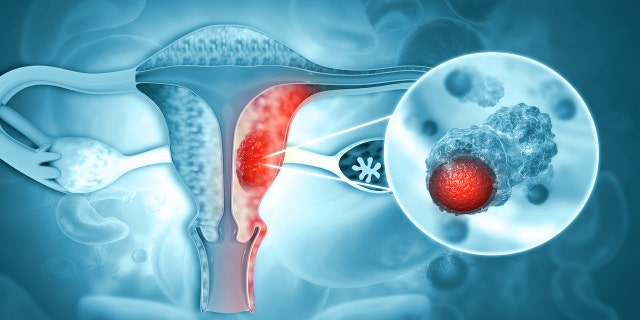Health
Uterine cancer deaths could soon outnumber deaths from ovarian cancer, oncologist says: ‘We need to do better’

The most common type of gynecologic cancer in the U.S. has been on the rise in recent years — and there’s no standard screening for it.
Uterine cancer will affect about 66,200 women in 2023 in the U.S. — and around 13,000 will die from the disease, per the American Cancer Society (ACS).
“While we are seeing a downward trend in overall cancer cases, uterine cancer is one of the few types where we’re seeing an upward trend,” said Dr. Brian Slomovitz, director of gynecologic oncology and co-chair of the Cancer Research Committee at Mount Sinai Medical Center in Miami Beach, Florida, in an interview with Fox News Digital.
CHEMICAL HAIR-STRAIGHTENING PRODUCTS MAY INCREASE UTERINE CANCER RISK: NIH STUDY
“We’re anticipating that the number of deaths in the United States due to uterine cancer is soon going to outnumber the deaths due to ovarian cancer,” he added.
To help raise awareness, the International Society of Gynecologic Cancer announced the first-ever Uterine Cancer Awareness Month in June.
Dr. Brian Slomovitz is director of gynecologic oncology and co-chair of the Cancer Research Committee at Mount Sinai Medical Center in Miami Beach, Florida. He also serves as chair of the Uterine Cancer Awareness Month initiative. (Mount Sinai Medical Center)
Slomovitz — who also serves as chair of the Uterine Cancer Awareness Month initiative — spoke to Fox News Digital about the state of uterine cancer and what women need to know.
Uterine cancer and endometrial cancer: What’s the difference?
The terms “uterine cancer” and “endometrial cancer” are often used interchangeably, but there is a difference, Slomovitz said.
A vast majority of these types of cancers occur in the outer and inner layers of the uterus, known as the endometrium — hence the term “endometrial cancer.”
About 4% to 5% of the cancers occur in the muscle of the uterus. These are known as uterine sarcomas.
NEW YORK DOCTORS USE ARTIFICIAL INTELLIGENCE TO BETTER DETECT BREAST CANCER
“Sarcomas are aggressive diseases with a tremendously high death rate,” Slomovitz explained. “But all of them fall in the category of uterine cancers.”
The biggest risk factor of all
Obesity is the biggest risk factor for uterine cancer, Slomovitz said.
“Fat tissue increases the amount of estrogen in the body, and endometrial cancer is a hyper estrogenic,” he explained. “It stimulates the lining of the uterus to the point of uncontrolled proliferation into cancer.”

“There are some game-changing studies coming out, as we try to fill this unmet need to help our patients live longer,” said Dr. Slomovitz, shown here. (Mount Sinai Medical Center)
Overweight women (with a body mass index of 25 to 29.9) have twice the risk of developing uterine cancer as women at a healthy weight, the ACS website states.
Obese women (BMI of 30 or higher) have three times the risk.
Those with diabetes, which is closely related to obesity, are also at a higher risk.
Obesity and age are two of the biggest risk factors for uterine cancer.
A less common risk factor could be polycystic ovarian syndrome (PCOS), which is a hormonal disorder that can lead to enlarged ovaries and the formation of cysts.
PCOS leads to elevated estrogen levels and lower progesterone levels, which can raise the risk of endometrial cancer, according to the American Cancer Society (ACS) website.
Some hereditary syndromes can make women more susceptible to uterine cancer.

Dr. Slomovitz has worked in the field of gynecologic oncology for over 20 years; he currently serves as director of gynecologic oncology and is co-chair of the Cancer Research Committee at Mount Sinai Medical Center in Miami Beach. (Mount Sinai Medical Center)
“One of those is Lynch syndrome, which was often associated with colorectal cancer,” said Slomovitz.
“We know that half the women who develop cancer from Lynch syndrome develop endometrial cancer.”
Age is also a risk factor, as most patients are diagnosed in their 50s and 60s, the doctor said.
“The increase in cases may be due to obesity, but we’re also seeing longer life expectancy,” he noted. “The older people get, the more likely that they are to get endometrial cancer, obviously.”
Symptoms and screening
While other cancers have specific, recommended screenings — such as mammograms for breast cancer and colonoscopies for colorectal cancer — there are no pre-symptomatic screenings for uterine cancers, per the Centers for Disease Control and Prevention (CDC).
The Pap smear (Pap test) checks for cervical cancer and precancerous cells in the cervix, but does not screen for uterine cancer.
CERVICAL CANCER: WHAT ARE THE SIGNS AND SYMPTOMS?
The most common sign or symptom of uterine cancer is abnormal bleeding, Slomovirz said.
“Most uterine cancer patients have postmenopausal bleeding as an early sign or symptom — however, that’s not the case for everyone,” he said.
In premenopausal women, it can be more difficult to determine what constitutes “abnormal” bleeding, the doctor noted.

Uterine cancer will affect some 66,200 women in the U.S. in 2023 — and around 13,000 women will die from it, per the American Cancer Society. (iStock)
“They shouldn’t just assume it’s changes in their menstrual cycle,” he said.
In the absence of a formal screening process, Slomovitz stressed the need to recognize symptoms and take quick action.
“We need to better educate patients to come see their doctors sooner if they have symptoms,” he told Fox News Digital.
“We need to better educate patients to come see their doctors sooner.”
In addition to bleeding, other symptoms may include pelvic pain or pelvic pressure.
TWO NEW CANCER PILLS SHOW ‘UNPRECEDENTED’ RESULTS IN BOOSTING SURVIVAL RATES AND PREVENTING RECURRENCE
“We always tell people that if they have symptoms that are worsening or if they persist after 10 to 14 days, they should come in to see their doctor just to make sure everything’s OK,” Slomovitz said.
“We’re still seeing a large number of patients who are diagnosed with advanced and recurrent disease.”

“We need to better educate patients to come see their doctor sooner if they have symptoms,” said Slomovitz. (iStock)
The diagnosis process typically starts with an ultrasound to take images of the uterus, followed by a tissue biopsy — either to diagnose or rule out the disease, said Slomovitz.
In cases of advanced cancer, patients will usually get additional tests — such as chest X-rays, CT scans, MRIs or PET scans — to determine if the disease has spread.
“It traditionally spreads through the lymphatic system, which means lymph nodes can be enlarged,” Slomovitz explained. “It can also spread to the liver or the lungs through the blood system.”
“Eighty percent of women are cured with a hysterectomy.”
In patients who have had endometrial cancer in the past, a gynecologic oncologist will instruct them that for any future symptoms, recurring cancer must be ruled out.
“They’re cancer patients — so even in the non-specific symptoms, it’s worthy of seeing their oncologist again to make sure it’s not coming back,” Slomovitz said.
Treatment options: ‘An unmet need’
In women who are diagnosed with uterine cancer, one of the first steps is usually a hysterectomy, which is the removal of the uterus.
“Eighty percent of women are cured with a hysterectomy,” Slomovitz said.
To further minimize risk, the doctor said medical professionals will often do lymph node sampling as well to make sure the cancer hasn’t spread.
“But for the additional 20% of patients who have advanced or recurrent disease, systemic therapies are needed,” he said. “We need to do better with treatment options for uterine cancer.”
For these aggressive cases, the systemic therapies have been chemotherapy or hormonal therapy, which uses progesterone to slow down tumor growth.
CLICK HERE TO SIGN UP FOR OUR HEALTH NEWSLETTER
This year, Slomovitz said, some breakthrough studies have shown that immunotherapy can be given in the first-line management of the disease.
Immunotherapy treatments work by helping the immune system to slow, stop or destroy cancer cells. It’s shown to be effective for lung cancer, oral cancer and melanoma, the doctor pointed out.

Symptoms of uterine cancer include abnormal bleeding and pelvic pain. (iStock)
At the American Society of Clinical Oncology conference in May 2023, researchers presented promising results for a new class of drugs called antibody-drug conjugates (ADCS), a targeted therapy for treating cancer, Slomovitz said.
Health professionals are trying “to fill this unmet need to help our patients live longer.”
Future studies will continue to look at these types of targeted drugs.
“One of my career goals is to use immunotherapy and targeted therapy to eliminate the need for chemotherapy and its associated toxicities and side effects,” Slomovitz said.
Another “groundbreaking” advancement Slomovitz is particularly excited about is molecular classification, which divides uterine cancers into four different subtypes — thus allowing for more precise, personalized treatment options.
“We’re in a very exciting time,” he said. “There are some game-changing studies that are coming out, as we try to fill this unmet need to help our patients live longer.”

Health
Meghan Trainor Swaps Lyrics After Weight Loss + Opens up About Mounjaro

Use left and right arrow keys to navigate between menu items.
Use escape to exit the menu.
Sign Up
Create a free account to access exclusive content, play games, solve puzzles, test your pop-culture knowledge and receive special offers.
Already have an account? Login
Health
Psychedelics as potential mental health treatment are explored by Trump administration

NEWYou can now listen to Fox News articles!
The Trump administration has expressed interest in exploring psychedelics for their potential in treating PTSD and other debilitating mental health issues, various officials have shared.
“The Department shares the goal of ensuring that all Americans — especially our nation’s veterans — have access to safe and effective treatments for conditions such as PTSD, addiction and depression,” a spokesperson for the U.S. Department of Health and Human Services (HHS), run by Sec. Robert J. Kennedy Jr., said in a statement provided to Fox News Digital.
“Secretary Kennedy is committed to applying rigorous, evidence-based science to research efforts aimed at addressing these serious health challenges.”
FDA APPROVES FIRST AI TOOL TO PREDICT BREAST CANCER RISK
In recent years, researchers have been actively investigating the potential of psychedelics, such as MDMA and psilocybin (“magic mushrooms”) to treat mental health disorders.
MDMA is not approved for clinical use by the U.S. Food and Drug Administration (FDA), but can be studied in clinical settings.
Psychedelics research has gained support from the Trump administration for treating PTSD and mental health conditions. (iStock)
Psilocybin is listed as a Schedule I substance under the Controlled Substances Act, which means it has “a high potential for abuse, [is not] currently accepted for medical use in treatment in the United States, and [has] a lack of accepted safety for use under medical supervision.”
Psilocybin-assisted therapy, however, is legal in Oregon, Colorado and New Mexico.
‘Showing promise’
Psychedelic medicines are “showing real promise,” according to Dr. Luke Twelves, general practitioner and vice president of medical for Lindus Health in London.
Clinical trials have found such treatments safe and effective for patients battling serious mental health issues, according to Twelves.
COMMON SUPPLEMENTS AND MEDICATIONS COULD CAUSE LIVER DAMAGE, STUDIES SHOW
“Take psilocybin, for example — it’s demonstrating remarkable results for severe depression that hasn’t responded to other medications,” he told Fox News Digital. “MDMA is showing similar breakthroughs for PTSD treatment.”
Clinical trials are also investigating how psychedelics could help with end-of-life anxiety, addiction, eating disorders, chronic pain and OCD, he added.

In recent years, researchers have been actively investigating the potential of psychedelics, such as MDMA and psilocybin to treat mental health disorders. (iStock)
Researchers have faced challenges in terms of regulatory hurdles and proper placebo controls, Twelves said.
“Given that these treatments could transform [the] lives of people suffering from conditions where nothing else has worked effectively, it’s crucial that we complete this research properly,” he said. “The goal is to bring safe, proven psychedelic therapies to the patients who need them most.”
Potential for veterans
At President Trump’s May 1 cabinet meeting, Department of Veterans Affairs Secretary Doug Collins said that “we’re opening up the possibility of psychedelic treatment.”
Retired Army Sergeant Jonathan Lubecki recently told Fox News’ Alexandria Hoff that MDMA stopped his PTSD while he was participating in a clinical trial.

The VA is now opening up to the possibility of psychedelic treatment to promote the health of veterans. (iStock)
“[I] took my first dose of MDMA. I’ve only taken it three times as part of the clinical trial, haven’t taken it since, and haven’t found the need to take it since, because I haven’t had PTSD,” he said.
Peter Kasperowicz, Department of Veterans Affairs press secretary, told Fox News Digital the department is safely exploring all avenues that promote the health of veterans.
FALLUJAH VET TURNS MEDAL OF HEROISM INTO A HEALING MISSION FOR FELLOW WARRIORS WITH SERVICE DOGS PROGRAM
“Preliminary findings have produced positive results on psychedelic-assisted therapies for treating mental health conditions,” he said.
The VA is currently running 11 clinical trials in various phases, with a total of some 800 veterans expected to participate.
“The goal of these trials is to determine whether compounds such as MDMA and psilocybin can treat veterans with post-traumatic stress disorder, treatment-resistant depressive disorder, major depressive disorder and potentially other mental health conditions,” said Kasperowicz.

Psilocybin is a Schedule I drug under the Controlled Substances Act, but psilocybin-assisted therapy is legal in Oregon, Colorado and New Mexico. (iStock)
An MDMA study published in the Jan. 2025 issue of The American Journal of Psychiatry found that the substance is “unlike classical psychedelics.”
The study noted, “MDMA allows the individual to maintain intact ego functioning and a greater degree of cognitive and perceptual lucidity while still experiencing a prosocial altered state of consciousness that facilitates deeply emotional therapeutic breakthroughs.”
CLICK HERE TO SIGN UP FOR OUR HEALTH NEWSLETTER
The researchers concluded that MDMA showed “enhanced levels of trust, empathy, self-compassion and a ‘window of tolerance’” that traditional psychotherapy lacks.

The VA currently has 11 psychedelic clinical trials in various phases. (iStock)
Doug Drysdale, CEO of the Canadian pharmaceutical company Cybin, told Fox News Digital that “the time is now to address the mental health crisis.”
He said it is “gratifying” that administration officials value the potential benefits of looking into alternative mental health treatments.
“The time is now to address the mental health crisis.”
Cybin is currently in phase 3 of a study of CYB003, a type of psilocybin that has been granted breakthrough therapy designation by the FDA as an additional treatment for major depressive disorder (MDD).
“In Cybin’s completed Phase 2 MDD study, long-term efficacy results showed that 71% of participants were in remission from depression, and 100% of participants responded to treatment at 12 months after just two 16 mg doses of CYB003,” said Drysdale.
Risks and cautions
Dr. Marc Siegel, clinical professor of medicine at NYU Langone Medical Center and Fox News’ senior medical analyst, previously interviewed two of the country’s top researchers on psychedelics — Dr. Rachel Yehuda, founder and director of the Center for Psychedelic Psychotherapy and Trauma Research at Mt. Sinai in New York, and Dr. Charles Marmar, director of the PTSD research program at NYU Langone.
“There is a huge downside in terms of unregulated recreational uses.”
“They agree there is therapeutic potential if very carefully studied under very strict medical guidance, but there is a huge downside in terms of unregulated recreational uses,” Siegel told Fox News Digital at the time.

Experts emphasize the importance of administering psychedelics in a safe setting when treating mental health conditions. (iStock)
“Both doctors see likely therapeutic value to psychedelics if carefully managed by medical experts,” Siegel added.
Ryan Moss, chief science officer at Filament Health, a clinical-stage natural psychedelic drug development company in Canada, emphasized it’s important to administer psychedelics in a safe setting when treating mental health conditions.
For more Health articles, visit www.foxnews.com/health
“Psychedelic experiences can sometimes feature anxiety, hallucinations and paranoia,” Moss previously told Fox News Digital. “Some patients using traditional psychedelics have reported experiencing adverse cardiovascular events during clinical trials.”
To mitigate these risks, Moss recommended clinical trial participants receive thorough preparation and monitoring by trained professionals during sessions.
Melissa Rudy and Angelica Stabile, both of Fox News Digital, contributed reporting.
Health
Craving Sugar? Swap It for Healthy Fats and Watch Pounds Fall Off Stop Sugar Cravings Fast: How Healthy Fats for Weight Loss Keep You Satisfied

Use left and right arrow keys to navigate between menu items.
Use escape to exit the menu.
Sign Up
Create a free account to access exclusive content, play games, solve puzzles, test your pop-culture knowledge and receive special offers.
Already have an account? Login
-

 News1 week ago
News1 week agoVideo: Faizan Zaki Wins Spelling Bee
-

 Politics7 days ago
Politics7 days agoMichelle Obama facing backlash over claim about women's reproductive health
-

 News1 week ago
News1 week agoVideo: Harvard Commencement Speaker Congratulates and Thanks Graduates
-

 Politics1 week ago
Politics1 week agoMusk officially steps down from DOGE after wrapping work streamlining government
-

 Technology1 week ago
Technology1 week agoAI could consume more power than Bitcoin by the end of 2025
-

 News1 week ago
News1 week agoPresident Trump pardons rapper NBA YoungBoy in flurry of clemency actions
-

 Technology1 week ago
Technology1 week agoSEC drops Binance lawsuit in yet another gift to crypto
-

 Technology1 week ago
Technology1 week agoOpenAI wants ChatGPT to be a ‘super assistant’ for every part of your life














